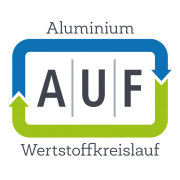Über Bedeutung, Herausforderungen und Potenziale von recyceltem Aluminium
Der Aluminium und Umwelt im Fenster- und Fassadenbau, kurz A/U/F e.V. und die Gütegemeinschaft GSB International haben Anfang dieses Jahres eine gegenseitige Mitgliedschaft vereinbart. Im aktuellen BESSER LACKIEREN Podcast erläutern Werner Mader, Geschäftsführer der GSB International in Düsseldorf, und Thomas Lauritzen, Vorsitzender des A/U/F e.V. und Leiter für den Bereich Nachhaltigkeit und Pressesprecher der Schüco International KG, die Hintergründe der Kooperation, die Möglichkeiten, Herausforderungen und Potenziale von recyceltem Aluminium sowie die Bedeutung für Beschichter.
Das neue Abkommen will die Möglichkeiten einer stärkeren Kooperation auf dem Gebiet des nachhaltigen Bauens sowie des Recyclings von Bauprodukten erschließen. „Der Recyclinganteil wird immer höher und immer bedeutender für die Reduzierung des CO2-Fußabdrucks. Auf der anderen Seite müssen unsere Mitglieder die Profile beschichten. Wir sprechen hier von Lebensdauern von 20, 30, 40 und mehr Jahren Jahren und da sollte die Beschichtung halten. Die Oberfläche ist immer noch der Imageträger des Gebäudes“, so Werner Mader, Geschäftsführer der GSB International, und Thomas Lauritzen ergänzt: „Wir brauchen eine Beschichtung. Das sind verschiedene Herausforderungen, die wir haben. Der A/U/F e.V. und die GSB International gehen einen gemeinsamen Weg, um nachhaltige Gebäude der Zukunft zu realisieren“.
Im A/U/F e.V. engagieren sich derzeit mehr als 200 Unternehmen, Planer und Architekten, um den geschlossenen Wertstoffkreislauf von Aluminiumprodukten im Baubereich zu fördern. Aktuell werden rund zwei Drittel der im Baubereich anfallenden Aluminiumschrotte durch das vom A/U/F eingeführte Zertifikat einem geschlossenen Wertstoffkreislauf zugeführt.
Die 1976 gegründete und in Düsseldorf ansässige GSB International widmet sich Qualitäts- und Gütefragen bei der Beschichtung von Aluminium und Stahl. Die GSB hat derzeit 166 Mitglieder in 24 Ländern. Sie arbeitet mit internationalen Partnern und akkreditierten Prüfinstituten zusammen. Die GSB setzt im Rahmen einer umfassenden ökologischen Verantwortung höchste Qualitätsmaßstäbe für ökologische und gesundheitlich unbedenkliche Verfahren und Produkte in der Beschichtungstechnik, wobei der Fokus auf nachhaltige und wertbeständige Oberflächenbeschichtungen im Bereich Architektur liegt. Aus diesem umfassenden Engagement resultiert, dass GSB-Oberflächen-Beschichtungen fester Bestandteil vieler Ausschreibungen sind. Um den Energieverbrauch zu reduzieren und den CO2 -Fußabdruck zu verringern, wird vermehrt auf recyceltes Aluminium (Sekundäraluminium) zurückgegriffen.
Die Beschichtungsindustrie ist besorgt, dass im Architekturbereich durch immer höhere Anteile von Sekundäraluminium in den Strangpressprofilen im Feld Probleme an den beschichteten Produkten auftreten können. „Wir haben Versuchsreihen und Korrosionsprüfungen mit den klassischen Legierungen und unterschiedlichen Anteilen von Sekundäraluminium durchgeführt. Es konnte gezeigt werden, dass der Recyclingtanteil keinen Einfluss auf die Ergebnisse der Korrosionsprüfungen hat, jedoch der Anteil der Legierungselemente Kupfer und Zink. Wir werden hierzu eine Empfehlung hinsichtlich der Grenzwerte geben. Darüber hinaus gibt es mit einem Institut ein Forschungsprojekt, indem der gesamte Vorbehandlungsprozess weiterentwickelt werden soll, damit die Anteile kritischer Elemente auch etwas höher sein dürfen“, so Mader Thomas Lauritzen betont, dass der Einsatz von Recyclingmaterialien etabliert ist: „Die Beschichtung ist nicht die Herausforderung, die Trennbarkeit der Materialien beim Recycling ist wichtig und wird für uns als Aluminiumsystemgeber zukünftig immer wichtiger. Fenster, Türen und Fassadenelemente müssen so konstruiert sein, dass sich die Materialien wieder problemlos trennen lassen. Da gib es noch Potenzial. Primäraluminium wird im Markt immer mehr zurückgehen und wir können davon ausgehen, dass wir die bestehenden Gebäude als Rohstofflager der Zukunft brauchen“.
Mit der Kooperation von A/U/F e.V. und der GSB International soll die Zusammenarbeit von Beschichtern und Metallbauunternehmen intensiviert werden und man wird sich gemeinsam den Herausforderungen bei der Beschichtung und einem steigendem Recyclinganteil stellen. Weitere Themen im aktuellen BESSER LACKIEREN-Podcast sind die Rohstoffknappheit, der Einfluss des Substrats sowie moderne Vorbehandlungs- und Beschichtungsprozesse.
Die aktuelle Folge ist unter www.besserlackieren.de/podcast zu finden.




